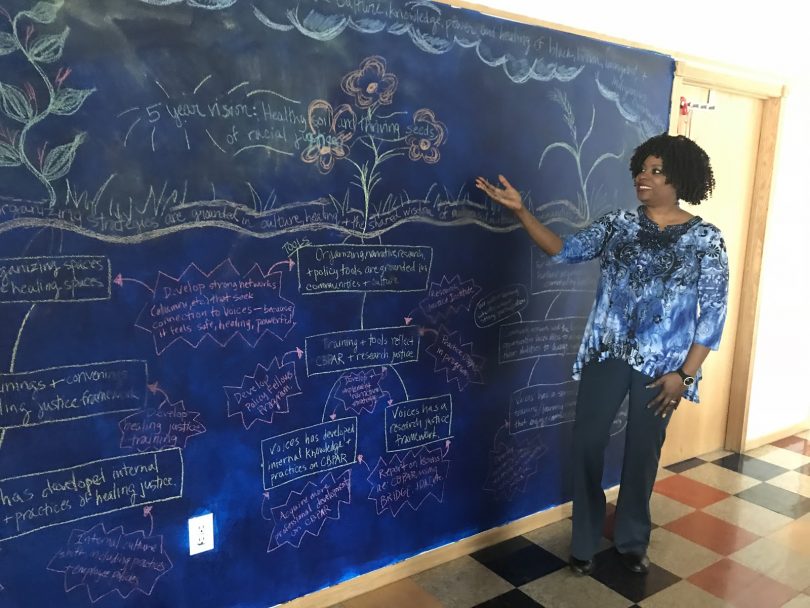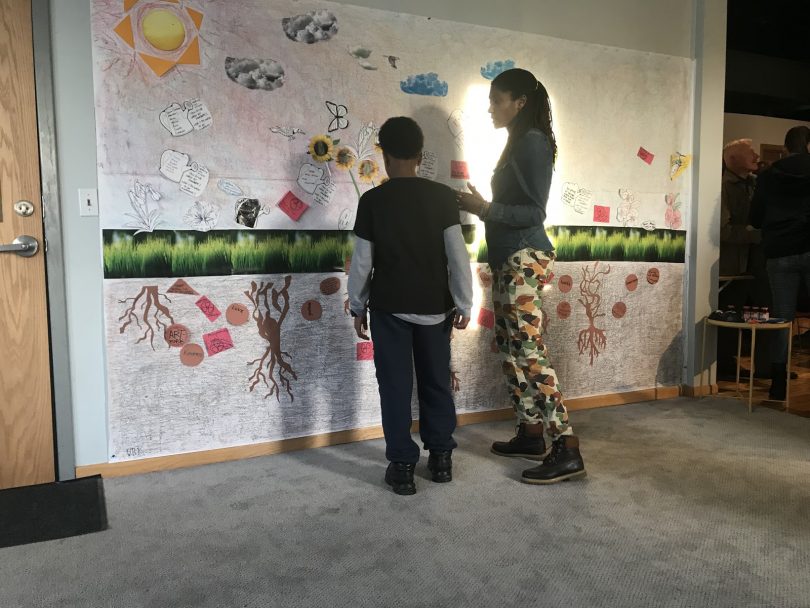ON CULTURE SHIFT, SHARED LEARNING & OUR EVOLUTION
HISTORY OF OUR EVOLUTION
At Voices for Racial Justice we have experienced three major evolutions of our longstanding community organizing training. In 1993 we started as the Organizing Apprenticeship Project (OAP) responding to the need for locally based community organizing training in our state, given that many of our community members felt they had to travel nationally to grow their skills as organizers. Organizers worked with mentors throughout the training in an apprenticeship model. Overtime, the OAP model was successful at growing our local networks of grassroots organizers until training cohorts were made up of mostly people of color and Indigenous people. Despite the success, it was not enough. Our organizers of color were hitting walls naming the limitations of diversity and inclusion, and a need for real racial justice oriented movement work in the field of organizing.
In 2006, we began to shift our training modules towards racial justice, and in 2014 we became racial justice centered from the inside out by centering leadership of color on our board and staff. We renamed our organization to Voices for Racial Justice and made an intentional commitment to getting organizing tools into the hands of Indigenous folks and folks of color. Despite the intentional centering of racial justice internally and externally, we started to notice how much mainstream or common organizing approaches and strategies even amongst our communities of color were steeped in and influenced by a culture of colonization and Whiteness.
In an exchange with organizers in Hawaii, our partners in Kalihi Valley raised the question of how militaristic common organizing approaches and language are, for example “base build, target, opponent, comrade, ally, frontlines, agitate” and so on. Our partners shared with us ways of organizing within Indigenous communities in Hawaii before U.S Occupation, such as the role of women’s work in peacekeeping as essential. We know our ancestors have resisted in many ways, some of us come from both warrior traditions and peacekeeping traditions and many more. At home in Minnesota, our organizers named both the pressure and pain of assimilation and burn out in the field of organizing, and as a remedy need to honor the various traditions we come from. In response, we began to reject the professionalization of organizing as a “field” in itself and began to embrace a village model of organizing, that many members of our community are a part of, where resistance is a way of life informed by many differing ancestral traditions and life experiences.
There is no one way to organize, and there is not one model organizer, but many ways, many peoples, many traditions and histories. This led to our third major combustion, and strategic shift towards integrating cultural strategy and healing justice throughout all of our work and training. Organizing, power, and healing, look and mean different things to our communities that are multicultural, multilingual and intergenerational. We do not assume one model fits all. We have now been building our organizing training from the ground up, in partnership with elders, youth, artists, incarcerated loved ones, parents, immigrant communities and so on.
We believe we are all experts in our own experiences, and there is no one expert as we shift to a collectively influenced training toolkit inspired by many folks of color and Indigenous folks across our state. We have found creating spaces for shared learning has been key in our work for racial justice and the development of our upcoming toolkit. At Voices, shared learning looks like breaking hierarchies, collectively defining what things mean to us, and sharing the wisdom in the room. It is interactive, hands on and reflective. It is practicing what we are learning from one another.
In our office we have a physical wall that has been converted to a movement garden. We’ve invited members of our community to add their contributions in response to what prompted our new strategic vision. Our partner and fellow community artist Ricardo Levins Morales says “The soil is more important than the seeds. Almost anything will grow in rich, nutritious soil, whereas it’s hard to get anything to grow if the soil is barren and toxic and won’t hold moisture. So the seeds are our projects, our initiatives, our institutions, that we want to build and the soil is the compost of beliefs, ideas, values, narratives that create the environment within which we are working.”
 At Voices we are centering our work around tending to the soil, meaning tending to the beliefs, values, narratives and ideas that make up the culture we are in. Part of how colonization works is when one group, culture, or way of being must dominate over others. Our remedy to colonization is biodiversity, to value the diversity in knowledge, culture, language, worldviews, medicines, plants and perspectives. This is not just metaphoric. In Minnesota we have massive mono-cropping where one crop is reproduced on a mass scale to the detriment of the soil, loss of Indigenous crops and cultures. The conditions of our physical soil often reflects the toxicity of dominant worldviews, values and beliefs. And we can replicate this toxicity amongst ourselves, by policing each other due to our differences rather than honoring how that makes us stronger. As we tend to our soil, we must also tend to our worldviews, values, and narratives that make up the culture that we live in.
At Voices we are centering our work around tending to the soil, meaning tending to the beliefs, values, narratives and ideas that make up the culture we are in. Part of how colonization works is when one group, culture, or way of being must dominate over others. Our remedy to colonization is biodiversity, to value the diversity in knowledge, culture, language, worldviews, medicines, plants and perspectives. This is not just metaphoric. In Minnesota we have massive mono-cropping where one crop is reproduced on a mass scale to the detriment of the soil, loss of Indigenous crops and cultures. The conditions of our physical soil often reflects the toxicity of dominant worldviews, values and beliefs. And we can replicate this toxicity amongst ourselves, by policing each other due to our differences rather than honoring how that makes us stronger. As we tend to our soil, we must also tend to our worldviews, values, and narratives that make up the culture that we live in.
MAKING CULTURE SHIFT
Tending to the soil is an invitation to take responsibility for the culture we live in and create. It is an invitation to shift practices that are not in alignment with a healthy ecosystem. Culture exists on many levels: personal, interpersonal, familial, collective, and institutional. There is culture we create, inherit and reject. What culture dominates is a reflection of power and who holds power. Culture shift happens when we take personal and collective responsibility for the culture we nurture. At the heart of our many cultures and worldviews we find our values.
As a multicultural team that serves a multi-cultural and intergenerational community we find our values are an interconnected web between us. In a conversation with longtime community organizers, Anishinaabe elders, and advocates Ricky DeFoe and Skip Sandman in Duluth, we are asked “what is your culture if you don’t know your values? Organizations want to talk about culture without talking about values, there is no culture without values.” Our culture and values are interlinked.
At Voices for Racial Justice we value our elders, cultural workers, and experts who carry the wisdom that influence us in how we tend to the soil of our movements. We were blessed to have Ricky DeFoe join us at the beginning of our Duluth organizing training kick off, grounding our circle in an exchange of what values we know are sacred to us and that have been informed by the worldviews of our loving and wise ancestors.
What we value gets our attention, time and resources and what we do not value gets forgotten and eventually left behind, and what is devalued gets destroyed. At Voices for Racial Justice we are aware of how power shapes what gets valued and the culture of how things are done within institutions, from schools to government departments, from the curriculum taught to the policies passed. We are aware of how toxic worldviews create toxic cultures that lead to toxic practices and norms.
We recognize that solutions to injustices and disparities will not come from the very toxic cultures and systems that created them. Nor will mainstream models and approaches to working with communities of color and Indigenous communities that focus on deficit, what is lacking, where there is harm, and what needs “fixing” — as if the people themselves are broken. Although it is true that our communities are facing many forms of injustice and disparities we know programming that focuses on “assimilating” folks of color and Indigenous people devalues the cultures, medicines, resources, and strengths our communities already have. We draw on the strengths, culture, traditions, within our communities as sources of knowledge, creative inspiration, healing and power.
At Voices for Racial Justice we value, honor and respect the diverse worldviews, cultures, and values of people of color and Indigenous people which requires we take a proactive stance against pressures that assimilate, erase and devalue our traditions, ways of being, cultures, history, and languages. Cultural strategy and shared learning requires expansiveness to value other ways of being that are different from our own. We welcome cultural differences while leaning into sharing our collective values informing the culture of racial justice we create together.

